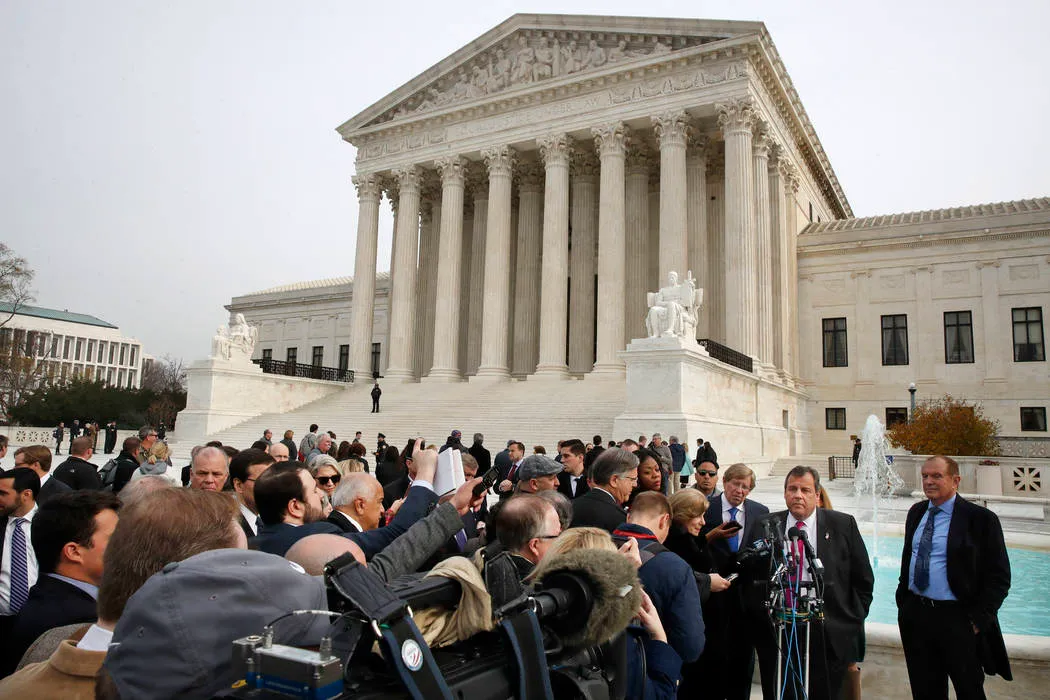
In May 2018, the United States Supreme Court made a landmark decision that would forever change the world of sports betting. The Court ruled against the Professional and Amateur Sports Protection Act (PASPA), a federal law that prohibited states from legalizing and regulating sports betting. This decision opened the doors for states to legalize and regulate sports betting within their borders, leading to a rapid expansion of the industry.
The ruling had a massive impact on the sports betting landscape in the US, with many states rushing to pass legislation to allow it. The decision also brought about a significant shift in the perception of sports betting, as it was no longer seen as an underground activity but rather a legitimate form of entertainment. In this article, we will explore the Supreme Court’s decision on sports betting and its implications for the industry.

The History of PASPA and Its Demise
What is PASPA?
The Professional and Amateur Sports Protection Act of 1992, also known as PASPA, was a federal law that aimed to prevent the spread of sports betting in the United States. It was passed by Congress and signed into law by President George H.W. Bush in 1992. The law effectively banned sports betting in all but four states – Nevada, Delaware, Oregon, and Montana – where it was already legal.
The main purpose of PASPA was to protect the integrity of sports and maintain public confidence in the games. It prohibited states from authorizing, sponsoring, operating, or licensing any form of sports betting. This meant that any state that wanted to introduce sports betting would have to repeal their laws or amend their constitutions, which was a difficult process.
The Rise of Online Sports Betting
Despite the existence of PASPA, online sports betting continued to grow in popularity in the US. Many online sportsbooks operated offshore, where they were not subject to US laws. This led to a thriving black market for sports betting, estimated to be worth billions of dollars.
The illegal nature of online sports betting also made it difficult for states to regulate and tax the activity. As a result, many states saw the potential to legalize and regulate sports betting as a way to generate revenue and combat the illegal market.
The Legal Challenges to PASPA
Over the years, there have been numerous legal challenges to PASPA. The most significant one came from the state of New Jersey. In 2011, New Jersey voters approved a constitutional amendment to allow sports betting in the state. However, this was challenged by the NCAA and professional sports leagues, arguing that it violated PASPA.
New Jersey’s fight against PASPA continued for several years, with the state passing multiple pieces of legislation to try and circumvent the law. This led to several legal battles, including a case that went all the way to the Supreme Court.
The Supreme Court’s Decision: Murphy v. NCAA
The Case
In 2014, the state of New Jersey passed a law that would allow sports betting at casinos and racetracks. This was promptly challenged by the NCAA and major sports leagues, who argued that the law violated PASPA. The state argued that PASPA was unconstitutional, violating states’ rights under the Tenth Amendment.
The case made its way through the legal system, with courts ruling in favor of the leagues. However, in 2017, the Supreme Court agreed to hear the case. The case was renamed Murphy v. NCAA, with New Jersey Governor Chris Christie as the lead plaintiff.
The Arguments
The central issue in the case was whether PASPA violated the Tenth Amendment, which states that powers not delegated to the federal government are reserved for the states. New Jersey argued that PASPA forced states to enforce a federal law, which was a violation of states’ rights.
The leagues, on the other hand, argued that PASPA did not prevent states from repealing their laws but rather prohibited them from authorizing or licensing sports betting. They also contended that the law was necessary to protect the integrity of sports and to prevent corruption.
The Decision
In May 2018, the Supreme Court ruled in favor of New Jersey, declaring PASPA unconstitutional. The decision was a 6-3 vote, with Justices Alito, Roberts, Kennedy, Thomas, Gorsuch, and Breyer in the majority. Justice Ginsburg wrote the dissenting opinion, joined by Justices Sotomayor and Kagan.
The Court’s ruling stated that PASPA violated the Tenth Amendment as it commandeered state governments to enforce federal law. Justice Alito, who delivered the majority opinion, wrote, “Congress can regulate sports gambling directly, but if it elects not to do so, each State is free to act on its own.”
The decision effectively struck down PASPA, allowing states to legalize and regulate sports betting within their borders. This opened the doors for states to tap into the multi-billion dollar sports betting industry.
The Impact of the Supreme Court’s Decision

A Rapid Expansion of Sports Betting
The immediate impact of the Supreme Court’s decision was a rush of states looking to legalize sports betting. Within months, several states had passed legislation to allow it. Today, over two years after the ruling, sports betting is legal in 20 states and the District of Columbia. Many others have introduced bills and are expected to join the trend soon.
The speed at which states have expanded into sports betting is unprecedented. It took decades for only four states to offer it legally, but now more than half the country has some form of legalized sports betting. This has led to a significant increase in the number of sportsbooks, both physical and online, operating in the US.
A Boost to State Revenues
One of the main reasons why states rushed to legalize sports betting was the potential for increased revenues. The industry is highly profitable, with billions of dollars being wagered each year. By legalizing and regulating it, states can tap into this revenue stream and use it to fund various projects and programs.
For example, in New Jersey, which has one of the most successful sports betting markets in the country, the state collected over $36 million in tax revenue from sports betting in 2019 alone. This number is expected to increase as more states join the market.
Job Creation and Economic Growth
The expansion of the sports betting industry has also led to job creation and economic growth. With the legalization of sports betting, new businesses have emerged, including sportsbooks, technology providers, and data analysis companies. These businesses require employees, leading to a significant increase in job opportunities.
In addition, the sports betting industry has also led to a boost in tourism. States with legal sports betting have seen an increase in visitors due to major sporting events, such as the Super Bowl or March Madness. This influx of tourists brings in additional revenue for local businesses, leading to economic growth.
A Change in Perception of Sports Betting
Before the Supreme Court’s decision, sports betting was often seen as an underground activity associated with organized crime. However, with the industry now legalized and regulated, it has become more mainstream and socially acceptable. This has changed the perception of sports betting, making it a legitimate form of entertainment rather than an illicit activity.
The shift in perception has also brought about a change in the way sports leagues and organizations view sports betting. Many leagues and teams have entered into partnerships with sports betting companies, and some have even built sportsbooks within their stadiums. This shows a willingness to embrace sports betting and see it as a potential source of revenue.
Increased Consumer Protection
One of the main advantages of legalizing sports betting is that it allows for consumer protection measures to be put in place. With a regulated market, bettors can be confident that their funds are safe and that the games they are betting on are fair. In addition, states have implemented responsible gambling initiatives to help prevent problem gambling and addiction.
Challenges Faced After the Supreme Court’s Decision

A Patchwork of State Regulations
While the Supreme Court’s decision opened the doors for states to legalize sports betting, it also created a complex regulatory environment. Each state has its own laws and regulations regarding sports betting, leading to a patchwork of regulations across the country. This makes it challenging for operators to comply with different rules and for bettors to navigate the different markets.
In addition, because sports betting is still illegal at the federal level, there is no consistency in tax rates, licensing fees, or other regulations. This can make it difficult for businesses to operate efficiently and can lead to disparities in revenue generation among states.
Opposition from Anti-Gambling Groups
Despite the Supreme Court’s ruling, there is still opposition to sports betting from anti-gambling groups. These groups argue that legalizing sports betting will lead to an increase in problem gambling and could harm the integrity of sports. However, supporters of sports betting argue that legalization allows for better monitoring and regulation, making it safer for consumers.
Another concern is that the expansion of sports betting will lead to an increase in underage gambling. States have put various safeguards in place to prevent this, such as strict age verification processes and geolocation technology. However, it is an ongoing challenge that must be addressed by the industry and regulators.
The Influence of Sports Leagues
The sports leagues that were once staunchly against sports betting are now actively seeking partnerships with sports betting companies. However, some have raised concerns about the influence these leagues may have on the industry. For example, some leagues have called for a “integrity fee” – a percentage of wagers placed – to be paid to them to help cover the costs of monitoring and preventing corruption in sports.
Critics argue that this is just another form of taxation on the industry and could lead to higher odds and less competitive markets. This issue is still being debated, and it remains to be seen how much influence sports leagues will have on the future of sports betting.
The Future of Sports Betting in the US
A Growing Industry
Despite the challenges faced by the industry, the future of sports betting in the US looks bright. The market is expected to continue its rapid growth, with more states legalizing sports betting in the coming years. According to a report by Zion Market Research, the US sports betting market is projected to reach $8.9 billion by 2025, growing at a CAGR of 14.7% between 2019-2025.
The expansion of sports betting is not limited to traditional sports either. With the legalization of sports betting, states are also starting to consider other forms of wagering, such as esports betting. This opens up new opportunities for the industry and could lead to even more significant growth.
The Potential for Federal Regulation
While states are currently responsible for regulating sports betting within their borders, there is a growing call for federal regulation of the industry. Proponents argue that a federal framework would create more consistency and uniformity across the country, making it easier for operators to comply and for bettors to participate in different markets.
However, others argue that state regulation is working well and that federal intervention may bring about unnecessary complications. As the industry continues to grow, this debate over federal vs. state regulation is likely to intensify.
The Role of Technology
Technology has played a significant role in the expansion of sports betting in the US. The rise of mobile sports betting has made it easier for bettors to place wagers conveniently, leading to increased revenue for operators. As technology continues to advance, we can expect to see further innovations in the industry, such as live in-game betting and virtual reality experiences.
In addition, advancements in data analysis and artificial intelligence are helping sportsbooks and bettors make more informed decisions. These tools could potentially change the way bets are placed and could open up new opportunities for the industry.
Conclusion
The Supreme Court’s decision in Murphy v. NCAA was a game-changer for the sports betting industry in the US. It opened the doors for states to legalize and regulate the activity, leading to rapid growth and economic benefits. However, challenges remain, and the future of sports betting in the US is still uncertain.
As more states join the market, we can expect to see a maturing and evolving industry. With the right balance of regulation and responsible gambling measures, the expansion of sports betting could continue to bring about positive changes and have a significant impact on the world of sports.


